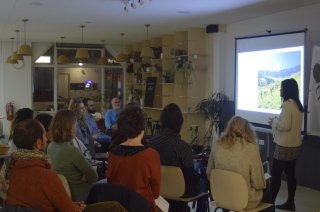
News
Review - The Commons
On the first day of snow, 2 speakers from the University of Utrecht fortunately made it to Thuis on the 22nd of January to share with us their vision on what comons are and how we can prevent Tragedies of the Commons to occur.
Frank van Laerhoven (UU) started the evening with a game that illustrated how easily a Tragedy of the Common occurs. With M&M's, representing money, students could invest in a fictive irrigation system that could provide them with possibly even more M&M's. While many students were inclined to invest M&M's in the irrigationsystem, the sharing of the benefits of the irrigation system did not go too well. One person ended up taking all the M&M's that were provided by the fictive irrigation system.
Frank then procedeed to explain how commons can be are governed and how the design principles of Elinor Ostrom can contribute to sustainable resource management of common-shared resources. The tendency for individuals is to under-invest in making irrigiation systems, nature conservation areas or other common shared resources. The other tendency is that individuals over-extract resources (fish, timber, M&M's). An institution is needed to govern the commons in a way in which the individuals get the incentive to invest more in the commons and extract produce in a fair way. Institutions can include state-governance, personal ethics or (power) relationships between the users of the commons.
Our second speaker of the evening, Yara Al Salman (UU), gave us a perspective on commons from a political philosophy perspective. She illustrated how difficult it can be to set up rules to govern commons. There is an issue of assigning who gets a right to have a say in governing a commons. Commons, such as forests and seas, are characterised by having a high accesability, but who determines who is allowed acces to extract timber from a forest?
We had a discussion about whether commons can provide a solution to provide sustainance for people where the market or the state is unable to provide this. Having common pool resources is a different way of creating an economy for people. Is this something that we will see more of in the future?
